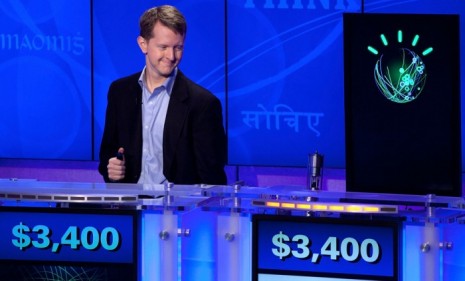Can a computer beat Ken Jennings at 'Jeopardy'?
IBM has created a machine that can perform 80 trillion operations a second. Can it take down the king of trivia?

A free daily email with the biggest news stories of the day – and the best features from TheWeek.com
You are now subscribed
Your newsletter sign-up was successful
An IBM super-computer is playing a series of "Jeopardy!" games against two of the quiz show's most famous champions, and the living, breathing contestants appear to be the underdogs in this battle between man and machine. In a practice round last week, the computer — a super-powerful machine called Watson that was created by IBM scientists — edged out Ken Jennings, the most famous contestant in the show's history, and Brad Rutter, another luminary. Watson has been programmed to answer "Jeopardy" questions within three seconds. The official contests air in February. Do Watson's human opponents stand a chance? (Watch the computer prevail in a trial round)
What is Watson?
It's a super-powerful machine — 10 times the size of a refrigerator — that IBM developed over four years to commemorate the company's 100th anniversary. Named after IBM co-founder Thomas J. Watson, the machine, "combines natural language processing, machine learning and information retrieval" to scan the information in its "brain" and identify seemingly appropriate information. It does it all in a flash, performing a stunning 80 trillion operations a second, and assigns a percentage to express its level of confidence that the answer is correct. To make it a trivia master, IBM researchers "scanned some 200 million pages of content" — including books, movie scripts, and entire encyclopedias — into its memory banks. Watson has drawn many comparisons to Deep Blue, another IBM supercomputer, which defeated chess grandmaster Garry Kasparov in a series of matches in 1997.
The Week
Escape your echo chamber. Get the facts behind the news, plus analysis from multiple perspectives.

Sign up for The Week's Free Newsletters
From our morning news briefing to a weekly Good News Newsletter, get the best of The Week delivered directly to your inbox.
From our morning news briefing to a weekly Good News Newsletter, get the best of The Week delivered directly to your inbox.
How will the game work?
Watson will square off against Jennings and Rutter in a series of three games, airing Feb. 14, 15, and 16. The winner will receive a $1 million dollar prize, the second-place finisher gets $300,000, and third place gets $200,000. (IBM has said it will donate any winnings to charity; Jennings and Rutter will also donate portions of their winnings.) Viewers will only see Watson as a computer monitor, and the machine will "will answer in a computer generated voice that is eerily reminiscent of HAL from 2001: A Space Odyssey," says Ian Paul at PC World — while Jennings and Rutter try to keep up. Watson will not be connected to the internet during the game, to prove its effectiveness purely as a database.
How did the practice game go?
At the IBM headquarters in Yorktown Heights, N.Y., Watson appeared at a press conference with Jennings, who became a "Jeopardy" legend by winning 74 contests in a row, and Rutter, who set a "Jeopardy" record with $3,255,102 in winnings. In a "slightly surreal" scene, says Sam Gustin at Wired, the three contestants played a quick practice round, with Watson sandwiched between the two human contestants. The computer was represented by a computer screen displaying its "avatar," which IBM describes as "a global map projection with a halo of 'thought rays.'" Watson answered the first four questions (in the category "Chicks Dig Me") to jump to an early lead, and at the end of round was ahead with $4,400 in winnings — Jennings was next with $3,400 and Rutter lagged behind with $1,200.
A free daily email with the biggest news stories of the day – and the best features from TheWeek.com
Does Watson have any weakneses?
Yes. Once in a while, Watson will "misinterpret the context of a given question and offer an answer that's so far off the mark it's humorous," says USA Today. In an article about the system over the summer, The New York Times reported on Watson's limitations: "When the computer was asked to complete the phrase "Toto, I've a feeling we're not in Ka—," Watson offered “not in Kansas anymore,” which was incorrect, since the precise phrasing was simply "Kansas anymore," and "Jeopardy!" is strict about phrasing." During the practice round, says PC Magazine, the system "struggled most with Jeopardy's fill-in-the-blank questions, which require one to correctly consider the text before and after the requested answer."
What else is Watson capable of?
Scientists are hopeful it could help make many fields more efficient — particularly healthcare, which is the "most immediate priority," says USA Today. Watson could help doctors searching for a diagnosis by easily "sifting through mountains of data in mere seconds." "We really believe — I don't want to be overly dramatic — but we could save lives with this," says an IBM senior vice president.
Sources: Time, PC World, Wired, USA Today, New York Times
-
 The mystery of flight MH370
The mystery of flight MH370The Explainer In 2014, the passenger plane vanished without trace. Twelve years on, a new operation is under way to find the wreckage of the doomed airliner
-
 5 royally funny cartoons about the former prince Andrew’s arrest
5 royally funny cartoons about the former prince Andrew’s arrestCartoons Artists take on falling from grace, kingly manners, and more
-
 The identical twins derailing a French murder trial
The identical twins derailing a French murder trialUnder The Radar Police are unable to tell which suspect’s DNA is on the weapon